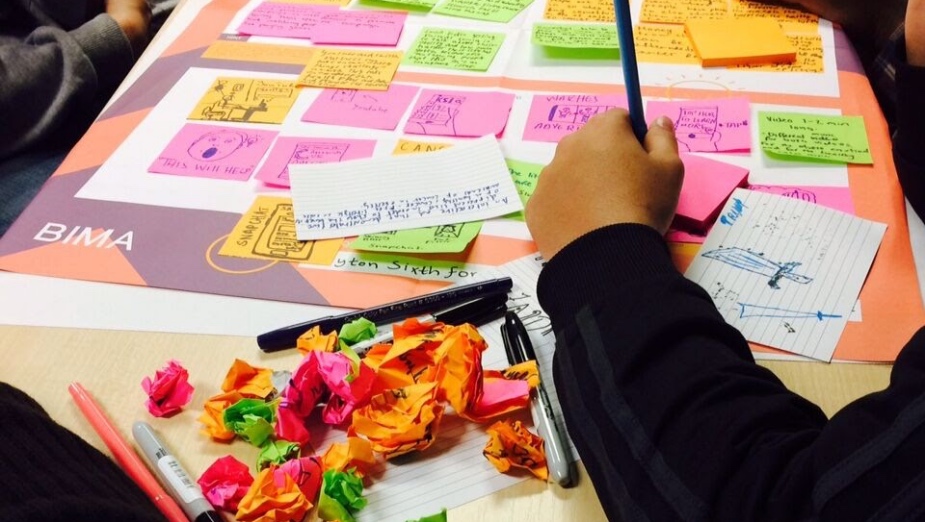
Each Year BIMA Goes into Schools for Digital Day – 2020 Might Be the Most Important Yet

BIMA, the UK’s trade and technology body, takes digital skills seriously. Every year they work with schools to open up the industry and to expose pupils to the variety of roles out there, and to inspire them to create and innovate using tech. This year, things are a little different. British kids have had a crash course in remote technology and digital learning thanks to the Covid-19 pandemic – and while schools may be open, the usual format that sees professionals head into classrooms is pretty tricky.
So this year, BIMA has created a month-long programme of learning for 10,000 students. They’ll be tasked with briefs that tackle food poverty, a highly timely topic given the struggles caused by lockdown redundancies and, of course, highlighted by footballer Marcus Rashford’s free school meals campaign.
Despite the impact of Coronavirus restrictions on the economy, BIMA recently found that 44% of member agencies are still recruiting and 95% reported that a lack of skills was holding back their growth. So, for young people, looking warily to the future, the digital sector seems to be a positive prospect.
Holly Hall, BIMA’s managing director spoke to LBB’s Laura Swinton about the changes to the programme and why Digital Day is more important than ever.
LBB> In your conversations with schools ahead of this year's Digital Day, what have you been hearing from teachers about the specific needs following a year of online teaching?
Holly> Teachers are understandably under a lot of pressure to 'catch up' but at the same time they are very conscious of students not missing out. Those that regularly take part in BIMA Digital Day really wanted to make sure that students didn't lose the opportunity to connect with industry and understand more about roles, responsibilities and how to access digital careers. They understand the importance of programmes like this and really value them.
LBB> And how do you think this year has highlighted the importance of digital skills among schools and pupils ?
Holly> We've seen rapid acceleration of digital transformation across every sector. Education has been right up there, from Google Classroom to teacher Zoom calls, so I don't think anyone can deny the importance of digital skills in education and future opportunities. Our specific challenge with Digital Day is getting students, teachers and parents alike to understand the breadth of digital and tech roles out there. We're going to see a rapid change in this decade - by 2030 70% of jobs will be totally different and digital applies to every subject area from art to science. There are a myriad of ways in, from job placements to apprenticeships and the new T Levels.
LBB> This has been a very unequal lockdown, and access to computers and the internet was a massive issue for children from poorer households. What sort of conversations have you had/actions have you taken to take this into consideration?
Holly> The pandemic has exacerbated the problem but pupils’ access to hardware has always been a challenge for us. Partly because of this and partly because BIMA Digital Day is an exercise in ideas and imagination first and foremost, the programme requires very little access to tech. Students are asked to put pen to paper and use the tried and tested Post-It method for most of the sessions. We also think it's really important that students understand a role in digital isn't necessarily purely 'technical' and is as much about strategy, creativity and empathy.
LBB> In industry we've seen an acceleration of digital transformation as a result of lockdown - is that acceleration mirrored in how schools are teaching digital skills?
Holly> The honest answer is that we don’t know. What I would assume is that, of course, teaching provision has shifted to digital at greater speed but I very much doubt significant systemic changes have been made in the last nine months to accelerate the offering and adoption of digital skills. The challenge for the education system is the length of time it takes to propose, debate and legislate changes – if you look at how the industry has accelerated, there have to be lessons that can be learned – don’t miss out on the opportunity for something positive to come out of the mess, in the form of modernising our curriculum!
LBB> Why was it important to theme the Digital Day around food poverty?
Holly> We were looking for a challenge that had particular relevance to the UK's current situation and would also capture the imagination of young people. That food poverty is an issue in this country is something everyone should acknowledge and be concerned about. For the 11-16 year olds that take part in Digital Day it's of particular significance - not only do many schools work with local Food Banks and many students may have first hand experience of them, but they also teach the UN Sustainable Development Goals of which number two, The Zero Hunger Goal, is about ensuring everyone has the right to food. Last but not least, it's important to show how digital and tech can be a force for good and that it can help solve some of the big societal issues of our time.
LBB> What practical issues have you faced in bringing this year's Digital Day to life and navigating restrictions?
Holly> It very quickly became apparent that bringing industry and schools together physically or even live using video conferencing was going to be nigh-on impossible due to Covid restrictions and pupil confidentiality. Our second major challenge was the need for the majority of schools to adhere to a pretty strict timetable. Our third - as we're all experiencing right now, time is at a premium. With all of this in mind we hope we created the most flexible and 'resource light' Digital Day ever.
LBB> We've seen the British government try to urge those in the arts to retrain, to 'do digital' - what did you make of that push? And what would have made it more relevant and useful?
Holly> The campaign was a crass and misjudged move that demonstrated how the government undervalues our arts sector. As we’ve stated, every industry needs to have a strong capability and understanding of digital and technology. This is about enriching, embracing and taking sectors forward, whilst fundamentally understanding and respecting that specific industry’s craft, skill and profession.
If the government really wanted to be useful they could have talked to the opportunity that exists in the creative sector, the value of creativity and how integral divergent skills and mindsets are to the digital future. One of the biggest focus areas we’re seeing for business coming through the pandemic is empathy, experience-led and human-focused solutions. All very aligned to people working in the arts.















